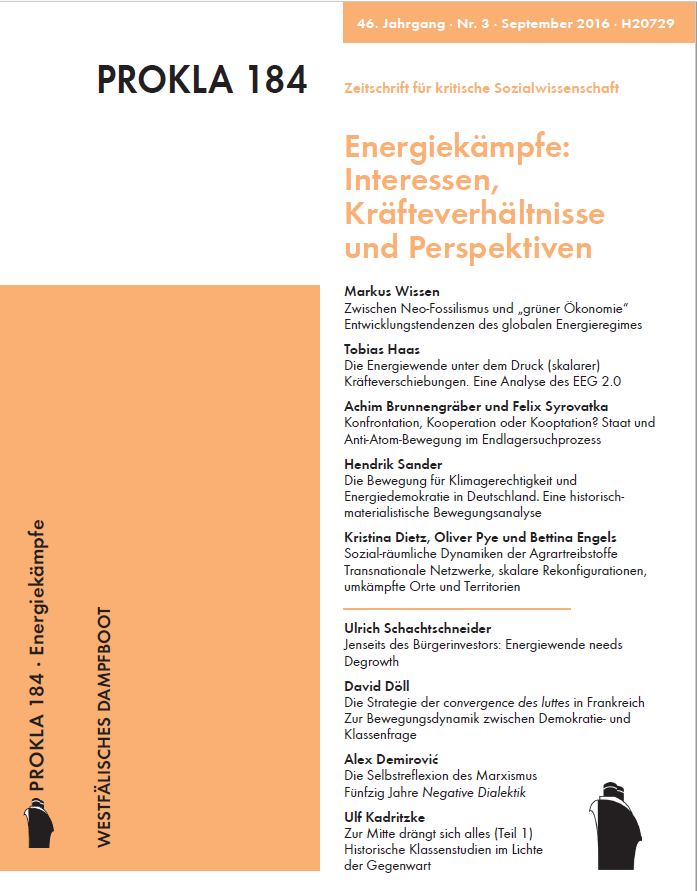Die Selbstreflexion des Marxismus.
Fünfzig Jahre Negative Dialektik
DOI:
https://doi.org/10.32387/prokla.v46i184.126Schlagwörter:
Adorno, Negative Dialektik, Marx, Hegel, DialektikAbstract
The article argues that Adorno’s book Negative Dialectics is a major contribution to the Marxist debate. Adorno’s starting point is a critique of Marx’ eleventh Feuerbach-thesis that the world should not be longer interpreted but changed. After all the defeats that the left and Marxist theory had to experience since the middle of the 19th century Adorno argues for a renewal of theory by a self-reflexive turn of Marxism. As an important moment of this self-reflection a critical assessment of dialectics itself is necessary. Adorno criticized the traditional idea of the negation of negation and the expectation of a positive result as well as the notion of totality. Critically approaching Hegel, he sees him as the affirmative theorist of the tendency of the bourgeois society to totalize itself. In opposition to this – and in difference to any Hegel-Marxism – Adorno conceive of dialectics as negative i.e. it has itself a temporal index and is a form of intellectual appropriation of the world only under conditions of domination. To think in an emancipatory way then has as a consequence to develop a non-systematic theory and to be sensitive for the movements and contradictions of concepts that attract themselves and form constellations.
Downloads
Literaturhinweise
Adorno, Theodor W. (1951): Minima Moralia. In: Ders.: Gesammelte Schriften, Bd. 4. Frankfurt/M 1980.
- (1963): Drei Studien zu Hegel. In: Ders.: Gesammelte Schriften, Bd. 5. Frankfurt/M 1971: 247-381
- (1964): Philosophische Elemente einer Theorie der Gesellschaft. In: Ders.: Nachgelassene Schriften, Bd. IV.12. Frankfurt/M 2008.
- (1966): Negative Dialektik. In: Ders.: Gesammelte Schriften, Bd. 6. Frankfurt/M 1977: 7-412.
- (1969): Zur Spezifikation der kritischen Theorie. In: Theodor W. Adorno Archiv (Hg.): Adorno. Eine Bildmonographie. Frankfurt/M 2003: 292.
- (1970): Editorisches Nachwort. In: Ders.: Gesammelte Schriften, Bd. 7. Frankfurt/M 1970: 535-544.
Althusser, Louis (1965): Für Marx, Berlin 2011.
Demirović, Alex (2015): Ordnung und Integration. Adornos Kritik am Gravitationsgesetz des Ganzen. In: Bröckling, Ulrich u.a. (Hg.): Das Andere der Ordnung. Theorien des Exzeptionellen. Weilerswist: 169-188. https://doi.org/10.5771/9783845277301-169
Foucault, Michel (1976): In Verteidigung der Gesellschaft, Frankfurt/M 1999.
Freyer, Hans (1933): Herrschaft und Planung. Zwei Grundbegriffe der politischen Ethik. In: Ders.: Herrschaft, Planung und Technik. Aufsätze zur politischen Soziologie. Weinheim: 17-43.
Haug, Wolfgang Fritz (1995): Dialektik. In: Ders. (Hg.): Historisch-kritisches Wörterbuch des Marxismus (HKWM), Bd.2. Hamburg: 657-693.
Honneth, Axel/Menke, Christoph (Hg.) (2006): Negative Dialektik. Berlin.
Horkheimer, Max (1937): Traditionelle und kritische Theorie. In: Ders.: Gesammelte Schriften, Bd. 4. Frankfurt/M 1988: 162-214.
-/Adorno, Theodor W. (1947): Dialektik der Aufklärung. In: Horkheimer, Max: Gesammelte Schriften, Bd. 5, Frankfurt/M 1987.
Marx, Karl (1845): Thesen über Feuerbach. In: Marx-Engels-Werke (MEW), Bd. 3. Berlin 1969: 5-7.
Marx, Karl (1873): Das Kapital, Bd. I. In: Marx-Engels-Werke (MEW), Bd. 23, Berlin 1969.
Seel, Martin (2006): Negative Dialektik. In: Honneth, Axel/Institut für Sozialforschung (Hg.): Schlüsseltexte der Kritischen Theorie. Wiesbaden: 56-60.
Sommer, Marc Nicolas (2016): Das Konzept einer negativen Dialektik. Adorno und Hegel. Tübingen. https://doi.org/10.1628/978-3-16-154187-2





